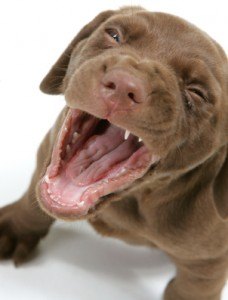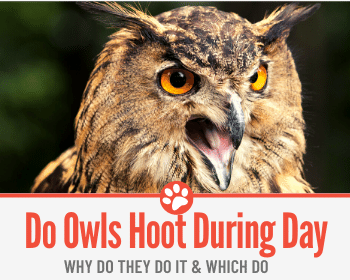Food is obviously a potential issue as well. I remember when the Atkins Diet was a huge fad for us humans to lose weight. One of the side effects of eating meat 24/7? Bad breath. The same goes for your puppy. To be blunt, you might try changing up their dog food. Buy them a bag of good, organic food and see if their breath changes. In many cases, it will and their coat will look much better as well.
The first thing to understand is puppies generally have bad breath. They are just developing as animals so their digestive system is undergoing major changes. Most have just come off of their mother’s milk, so the enzymes they use to digest food are also changing. Cumulatively, this leads to bad breath and is even referred to by dog owners as “puppy breath” with accompanying raised eyebrows.
What if it doesn’t go away? If 12 weeks pass and your pup still smells like it gargles with skunk every morning, then plan a visit to the vet just to make sure there isn’t a bigger issue. The vet will be able to take a look at their digestive system, analyze blood and give you a good idea of what is going on.
 You’ve been looking at purebred puppies for sale and have finally picked one. He is so cute! He waddles over to you as you sit on the floor to play with him. You pick him up and hold him up to your face. He opens his mouth and…OH MY GOD. His breath smells like he has been chewing on a skunk for a few hours. Why does your puppy’s breath smell like a skunk? He is not possessed by some skunk devil. No, there’s an answer.
You’ve been looking at purebred puppies for sale and have finally picked one. He is so cute! He waddles over to you as you sit on the floor to play with him. You pick him up and hold him up to your face. He opens his mouth and…OH MY GOD. His breath smells like he has been chewing on a skunk for a few hours. Why does your puppy’s breath smell like a skunk? He is not possessed by some skunk devil. No, there’s an answer.
Now the bad news. Skunk breath is not always caused by enzyme issues. In some cases, a puppy can have a problem with its esophagus. This results in gases escaping up through its mouth. In such a case, the smell is usually so bad that you will be willing to give up your first born child just to have the skunk breath back. If you suspect your little one is having this issue, haul them off to the vet for a checkup.
Puppy Breath Smells Like Skunk?
Just like how bad bacteria can accumulate in your mouth after a night of no brushing, dogs are similarly vulnerable to the dreaded morning breath. To put it simply, bad breath is the result of an odor-producing bacteria build up in your dogs gut, mouth, or even lungs.
Your dogs breath is an aromatic language that can tell you many things about his health. Long term bad breath in dogs is nothing to woof at, as it can be a symptom of serious plaque, tartar, a lung issue, kidney infection, or a bacterial imbalance in your pups gut. Halitosis in older dogs can be more common and may be its bodys way of presenting an issue described above.
As these hungry hounds eat their – cutlery included – meals, they are slathering sugars onto their gums, teeth, and hard to lick places. Dog bad breath is caused by the mouths natural bacteria that thrive off of the sugars in food consumed. The bacteria then turns these sugars into acids shields on the teeth.
The combination of bacteria, plaque and saliva needs to be cleaned often, or else it will lead to bad breath. Your furry friend does his best to keep his snout area clean, but tongues can only do so much.
While many believe that the source of bad breath is in the mouth, it is important to remember that good gut health can be just as important. Some of those funky smells could be wafting up from a less than balanced digestive tract. Probiotics have been a part of healthy diet for dogs for a long time and they have been found to support good health by aiding in digestion, strengthening the immune system and fighting infections in the body. As these good bacteria move to the intestine, they thrive in the acidic atmosphere and can multiply. This proliferation of good bacteria help in healthy digestion of food and resetting of pH balance in the body.
What is Stinky Breath in Puppies?

You might have heard that bad breath can be a symptom of dental disease. However, in many cases, stinky breath in puppies is caused by something else. For instance, some dogs have a bad odor because they eat certain types of food that upset their digestive tract.
Unlike humans, dogs have fewer taste buds, so foods with a strong smell may lure your pup into eating them.
Other causes of stinky breath in puppies include dietary issues or underlying medical conditions. Some dogs have bad breath due to eating poop, either on their own or another dog. Other underlying medical conditions may also cause your puppy to have smelly breath, including diabetes and kidney diseases.
Another common cause of stinky breath in puppies is teething. During this period, your puppy is getting a series of vaccinations. If your puppy has an unusually strong breath during this time, you should bring the issue to the vet’s attention. Otherwise, your puppy may have a tooth problem.
Why Does a Puppy’s Breath Smell That Way?
 Owls are one of the most interesting nocturnal species within birds. They are frequently known for being active at night and sleepy throughout the daylight.
Owls are one of the most interesting nocturnal species within birds. They are frequently known for being active at night and sleepy throughout the daylight.
Owls possess a distinctive sound, and I bet I’m not the only one wondering if they hoot during the day, or it is just a night thing.
Yes, some owls Can hoot during the day. If you happen to hear an Owl hooting during the day it is most likely that it’s pygmy owl or barred owl that you are hearing.
They are Known To Hoot During the day as they are diurnal owls and can be active during the day, which is very uncommon compared to other owls.
Hooting represents an inherent vocal sound that most of the owls emit. Yes, not all of them make this sound! In fact, they can perform others like growls, shrieks, or barks. It is the case of the Barn owl. They don’t hoot! They shriek.
The vast majority of animals make sounds to express something. For example, the most common owl hoot that you could easily detect is from the great horned, and probably it is to claim a territory.